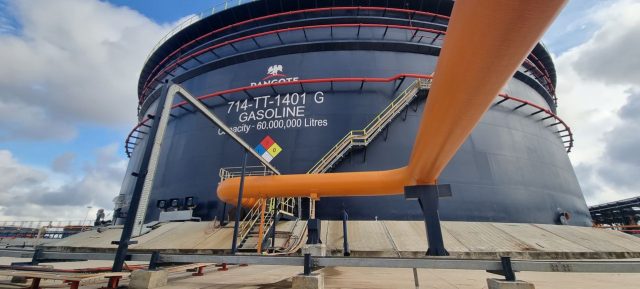Oil marketers have urged the federal government to review Dangote Refinery’s plan to distribute petroleum products directly to end-users, warning that the move could disrupt the existing supply structure and lead to job losses in the downstream sector.
Speaking at the Annual General Meeting of the Natural Oil and Gas Suppliers Association of Nigeria (NOGASA) in Abuja, the association’s president, Benneth Korie, called for intervention from President Bola Tinubu. He argued that the refinery’s distribution model could displace independent marketers and compromise supply chain stability.
“We are not against Dangote Refinery, but we believe that direct distribution will disrupt the existing system and cause more harm than good,” Mr Korie said. “We plead that Mr President intervene in this matter by telling Dangote to slow down, go by the rules of the game, focus on refining products and selling to marketers, who can then distribute to end-users.”
Dangote Refinery had announced plans to commence direct sales of petrol and diesel to various industrial users and marketers starting August 15. The company cited goals such as reducing logistics costs and improving efficiency.
Mr Korie, however, referenced past challenges with similar models. “We call the attention of the government to intervene by telling him to allow people to do their business. We have over 50,000 filling stations in Nigeria, and if Dangote Refinery takes over direct distribution, it will be difficult to meet the demand. This will lead to scarcity and insecurity, which will affect the entire system.”
Also speaking, Billy Gillis-Harry, National President of the Petroleum Products Retail Outlets Owners Association of Nigeria (PETROAN), said Dangote’s entry into the distribution chain could reduce competition.
“This massive refinery is expected to satisfy domestic fuel demand and export surplus products,” he said. “We are concerned that the company may use its market power to fix prices and limit competition, similar to what we’ve seen in other sectors.”
He also cited Dangote’s planned rollout of 4,000 Compressed Natural Gas-powered trucks as a development that may displace existing truck operators and drivers.
“This shift could lead to widespread job losses in the industry,” he said. “We hereby call on the Authority Chief Executive of the Nigerian Midstream and Downstream Petroleum Regulatory Authority (NMDPRA) and the Minister of State for Petroleum to put in place price control mechanisms to prevent any form of monopoly.”
At the meeting, a representative of the House of Representatives Committee on Petroleum Resources (Downstream) said lawmakers are monitoring developments around the refinery’s distribution plans. Ahmed Saba, who represented the committee chairman Ikeagwuonu Ugochinyere, said the National Assembly is reviewing how the move aligns with the Petroleum Industry Act (PIA).
“This is a big change, and I want to assure you that we are carefully looking into this situation,” Mr Saba said. “Our goal is to create a situation where everyone wins, following the rules set in the Petroleum Industry Act.”
He said the PIA is intended to improve transparency and accountability in the sector and that its implementation requires cooperation between government and private players.
“By working together, we can remove existing barriers, create a fairer and more competitive environment, and ultimately provide a more dependable and efficient system for distributing petroleum products to all Nigerians,” he said.







